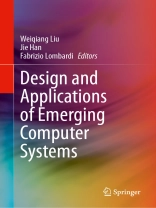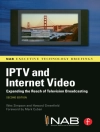This book provides a single-source reference to the state-of-the-art in emerging computer systems. The authors address the technological contributions and developments at various hardware levels of new systems that compute under novel operational paradigms such as stochastic, probabilistic/inexact, neuromorphic, spintronic, bio-inspired and in-memory computing. Coverage includes the entire stack, i.e., from circuit, architecture, up to system level. This book includes tutorials, reviews and surveys of current theoretical/experimental results, design methodologies and a range of applications.
Jadual kandungan
Part-I . In-Memory Computing, Neuromorphic Computing and Machine Learning.- Chapter 1. Emerging Technologies for Memory-Centric Computing.- Chapter 2. An overview of Computation-in-Memory (CIM) architectures.- Chapter 3. Towards Spintronics Non-Volatile Computing-in-Memory Architecture.- Chapter 4. Is Neuromorphic Computing the Key to Power-Efficient Neural Networks?: A Survey.- Chapter 5. Emerging Machine Learning using Siamese and Triplet Neural Networks.- Chapter 6. An active storage system for intelligent data analysis and management.- Chapter 7. Error-Tolerant Techniques for Classifiers beyond Neural Networks for Dependable Machine Learning.- Part-II . Stochastic Computing.- Chapter 8. Efficient Random Number Source Designs Based on D Flip-Flops for Stochastic Computing.- Chapter 9. Stochastic multipliers from serial to parallel.- Chapter 10. Ising Models Based On Stochastic Computing.- Chapter 11. Stochastic and Approximate Computing for Deep Learning: A Survey.- Chapter 12. Stochastic Computing and Morphological Neural Networks: an ultra-high energy-efficient Machine Learning methodology.- Chapter 13. Characterizing Stochastic Number Generators for Accurate Stochastic Computing.- Part-III . Inexact/Approximate Computing.- Chapter 14. Automated Generation and Evaluation of Application-Oriented Approximate Arithmetic Circuits.- Chapter 15. Automatic Approximation of Computer Systems through Multi-Objective Optimization.- Chapter 16. Evaluation of the functional impact of approximate arithmetic circuits on two application examples.- Chapter 17. Energy Efficient Approximate Floating-Point FFT Design Using A Top-Down Methodology.- Chapter 18. Approximate Computing in Machine Learning Systems: Cross-level designs and methodologies.- Chapter 19. Adaptive Approximate Accelerators with Controlled Quality using Machine Learning.- Chapter 20. Design Wireless Communication Circuits and Systems Using Approximate Computing.- Chapter 21. Low-cost Logarithmic Floating-point Multipliers for Efficient Neural Network Training.- Part-IV . Quantum Computing and Other Emerging Computing.- Chapter 22. Cryogenic CMOS for quantum computing.- Chapter 23. Memristive Crossbar System towards Hardware Accelaration of Quantum Algorithms.- Chapter 24. A Review of Posit Arithmetic for Energy Efficient Computation: Methodologies, Applications, and Challenges.- Chapter 25. Designing Fault Tolerant Digital circuits in Quantum-dot Cellular Automata.- Chapter 26. CMOS Circuit-based Fully Connected Ising Machines with Parallel Updating and Its Applications in MIMO Detection .- Chapter 27. Approximate Communication in Network-on Chips for Training and Inference of Image Classification Models.
Mengenai Pengarang
Weiqiang Liu is currently a Professor and the Vice Dean of College of Electronic and Information Engineering & College of Integrated Circuits, Nanjing University of Aeronautics and Astronautics (NUAA), Nanjing, China. He received the B.Sc. degree in Information Engineering from NUAA and the Ph.D. degree in Electronic Engineering from Queen’s University Belfast (QUB), Belfast, United Kingdom, in 2006 and 2012, respectively. In Dec. 2013, he joined the College of Electronic and Information Engineering, NUAA, where he is now a full professor.
His research interest mainly focuses on energy efficient and secure computing integrated circuits and systems that include approximate computing, computer arithmetic, hardware security, VLSI design for DSP and cryptography, and mixed-signal integrated circuits. His research has been funded by Natural Science Foundation China (NSFC), State Grid Corporation of China, et al. He has published 2 research books by Springerand Artech House, over 200 leading journal and conference papers (over 80 IEEE and ACM journals including 8 invited papers such as Proceedings of the IEEE). His papers were selected as the Highlight Paper of IEEE TCAS-I in the 2021 January Issue, the two Feature Papers of IEEE CASM in the 2021 4th issue and IEEE TC in the 2017 December issue, IET CDT Editor’s Choice Award in 2021, Best Paper Candidates of ISCAS 2011, GLSVLSI 2015 and GLSVLSI 2022. He received the prestigious Excellent Young Scientists Fund from NSFC in 2020 and the Young Scientist Award by Fok Ying Tung Education Foundation, Ministry of Education, China, 2022. He has been listed in the Stanford University’s list of the top 2% scientists in the world.
He is the Vice President-Elect for TA of the IEEE Nanotechnology Council (NTC). He has served as a Steering Committee Chair of IEEE Transactions on VLSI Systems, Associate Editors of IEEE Transactions on Circuits and Systems I: Regular Paper, IEEE Transactions on Emerging Topic in Computing and Computers, IEEE Transactions on Computers, IEEE Open Journal of Computer Society and IET Computers & Digital Techniques, a Guest Editor of Proceedings of the IEEE and IEEE Nanotechnology Magazine, the member of IEEE Symposium on Computer Arithmetic (ARITH) Steering Committee Member, 2020 TETC and Asian HOST 2021 Best Paper Award Committee. He is the Program Co-Chair of IEEE ARITH 2020, 17th IEEE/ACM International Symposium on Nanoscale Architectures (NANOARCH 2022) and IEEE Asian Hardware Oriented Security and Trust Symposium (Asian HOST 2023), and program members for a number of international conferences including DAC, ARITH, DATE, ASP-DAC, ISCAS, ASAP, ISVLSI, ICCD, GLSVLSI, Asian HOST, NANORACH, AICAS, Si PS, NMDC et al. He is a tutorial organizer and speaker in DAC 2022, DATE 2022, IEEE ISCAS 2021 and COINS 2021. He is a member of both Circuits & Systems for Communications (CASCOM) Technical Committee and VLSI Systemsand Applications (VSA) Technical Committee, IEEE Circuits and Systems Society. He is a Senior Member of the IEEE, CIE and CCF.
Dr. Jie Han received the B.Sc. degree in electronic engineering from Tsinghua University, Beijing, China, in 1999 and the Ph.D. degree from the Delft University of Technology, The Netherlands, in 2004. He is currently a Professor and Director of Computer Engineering in the Department of Electrical and Computer Engineering at the University of Alberta. His research interests include approximate computing, stochastic computing, brain-inspired learning systems and neural networks, reliability and fault tolerance, nanoelectronic circuits and systems, novel computational models for learning and biological applications.
Dr. Han was a recipient of the Best Paper Awards at the IEEE/ACM International Symposium on Nanoscale Architectures (NANOARCH 2015) and the Automation and Test in Europe Conference (DATE 2023), as well as four Best Paper Nominations at the 25th IEEE/ACM Great Lakes Symposium on VLSI (GLSVLSI 2015), NANOARCH 2016, the 19th International Symposium on Quality Electronic Design (ISQED 2018) and DATE 2022. He was nominated for the 2006 Christiaan Huygens Prize of Science by the Royal Dutch Academy of Science (Koninklijke Nederlandse Akademie van Wetenschappen (KNAW) Christiaan Huygens Wetenschapsprijs). His work was recognized by the 125th anniversary issue of the Science Magazine, for developing a theory of fault-tolerant nanocircuits (2003).
Dr. Han serves (or served) as an Associate Editor for the IEEE Transactions on Emerging Topics in Computing (TETC), IEEE Transactions on Nanotechnology, IEEE Circuits and Systems Magazine (CASM), IEEE Open Journal of the Computer Society, Microelectronics Reliability and the Journal of Electronic Testing: Test and Application (JETTA, Elsevier).
He served as a General Chair for the IEEE/ACM International Symposium on Nanoscale Architectures (NANOARCH 2021), GLSVLSI 2017 and the IEEE International Symposium on Defect and Fault Tolerance in VLSI and Nanotechnology Systems (DFT 2013), and a Technical Program Committee (TPC) Chair for NANOARCH 2022, GLSVLSI 2016, DFT 2012 and the Symposium on Stochastic and Approximate Computing for Signal Processing and Machine Learning in 2017. He also served as a TPC Member in many international conferences and symposia, including the Design Automation conference (DAC 2017-2019), Design, Automation & Test in Europe Conference (DATE 2014-2019, Topic Co-chair for 2021-2022 and Topic Chair for 2023), International Conference in Computer-aided Design (ICCAD 2018 – 2019), and DFT 2011-2022.
Fabrizio Lombardi graduated in 1977 from the University of Essex (UK) with a B.Sc. (Hons.) in Electronic Engineering. In 1977 he joined the Microwave Research Unit at University College London, where he received the Master in Microwaves and Modern Optics (1978), the Diploma in Microwave Engineering (1978) and the Ph. D. from the University of London (1982). He is currently the holder of the International Test Conference (ITC) Endowed Chair at Northeastern University, Boston.
Dr. Lombardi was the 2nd VP of the IEEE Computer Society (CS) and the 2021 President-Elect, so currently, he is the 2022-2023 President of the IEEE Nanotechnology Council (NTC). He is also a member of the IEEE Publication Services and Products Board (PSPB) (2019-2023). He was the VP of Publications of the IEEE CS (2019-2020) and the NTC (2020). He has been appointed on Executive Boards of many non-profit organizations (such as Computing-in-the-Core, now code.org the non-partisan advocacy coalition for K-12 Computer Science education) as well as the Computer Society (as an elected two-term member of its Board of Governors (2012-2017)) and the IEEE (as an appointed member of the Future Directions Committee (2014-2017)).
In the past Dr. Lombardi has been a two 2-year term Editor-in-Chief (2007-2010), Associate Editor-in-Chief (2000-2006) and Associate Editor (1996-2. 000) of the IEEE Transactions on Computers, the inaugural two-term Editor-in-Chief of the IEEE Transactions on Emerging Topics in Computing (2013-2017); Editor-in-Chief of the IEEE Transactions on Nanotechnology (2014-2019) as well as member of the Editorial Boards of the ACM Journal of Emerging Technologies in Computing Systems, the IEEE Design & Test Magazine, and IEEE Transactions on CAD of ICAS. Dr. Lombardi has been twice a Distinguished Visitor of the IEEE Computer Society (1990-1993 and 2001-2004). He serves as Chair of the Committee on ”Nanotechnology Devices and Systems” of the Test Technology Technical Council of the IEEE.
Dr. Lombardi is a Fellow of the IEEE for ”contributions to testing and fault tolerance of digital systems”. He was the recipient of the 2011 Meritorious Service Award and elevated to Golden Core membership in the same year by the IEEE Computer Society; he was the Chair of the 2016 and 2017 IEEE CS Fellow Evaluation Committee. He has been awarded the 2019 NTC Distinguished Service Award and the 2019 “Spirit of the CS” Award. He has received many professional awards: the Visiting Fellowship at the British Columbia Advanced System Institute, University of Victoria, Canada (1988), twice the Texas Experimental Engineering Station Research Fellowship (1991-1992, 1997-1998) the Halliburton Professorship (1995), the Outstanding Engineering Research Award at Northeastern University (2004) and an International Research Award from the Ministry of Science and Education of Japan (1993-1999). Dr. Lombardi was the recipient of the 1985/86 Research Initiation Award from the IEEE/Engineering Foundation and a Silver Quill Award from Motorola-Austin (1996). Together with his students, his manuscripts have been selected for the best paper awards at technical events/meeting such as IEEE DFT and IEEE/ACM Nanoarch.
Dr. Lombardi has been involved in organizing many international symposia, conferences and workshops sponsored by professional organizations as well as guest editor of Special Issues in archival journals and magazines. His research interests are emerging technologies (mostly nanoscale circuits and magnetic devices), memory systems, VLSI design and fault/defect tolerance of digital systems. He has extensively published in these areas and coauthored/edited ten books.












